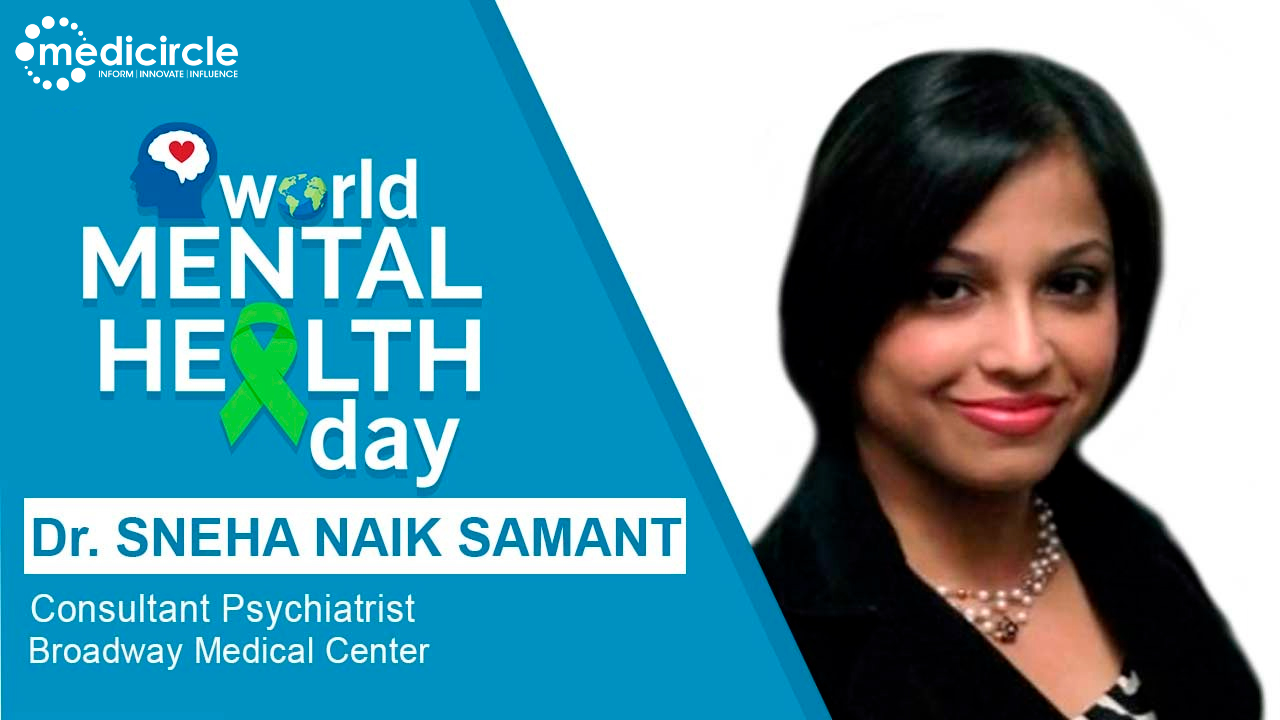Mental health matters because when we feel better, we do better. Mental health is important at every stage of our lives and impacts our thoughts, behaviors and emotions. It plays an important part in maintaining healthy relationships and allows you to adapt to changes in your life and cope with adversity.
World Mental Health Day (WMHD) is celebrated annually on 10 October, is organized by the World Federation for Mental Health and endorsed by the World Health Organization (WHO). COVID-19 pandemic has a major impact on people’s mental health, therefore the need to observe this day becomes even more
important. It’s important to talk about mental health, so others can also come forward about it. We at Medicircle are conducting the World Mental Health Day Awareness Series to raise awareness about mental health issues that are currently affecting the world and ensure people enjoy good mental health and wellbeing.
Dr. Sneha Naik Samant is a consultant Psychiatrist practicing for the last 5 years. She is currently working at Ananta Polyclinic in Mumbai. She is a firm advocate of mental health and strives for destigmatization of mental illness in our country. Apart from dealing with adult patients, she takes a keen interest in dealing with children and the elderly suffering from various psychiatric illnesses. Dr. Sneha believes that medications along with proper counseling of patients and their family go hand in hand for the successful treatment of patients.
Mental health matters
Dr. Sneha says, “The definition of health is a state of complete physical, mental, and social well-being and not merely being the absence of any disease. So, mental health consists of emotional, psychological and social well-being. It affects how we think, how we feel, how we act. It also determines how we handle stressful situations, how we behave with others in a social and professional environment."
Dr. Sneha mentions, "Mind and body are interconnected. So, if there is stress or anxiety, stress hormones get released, which can lead to physical illnesses like heart diseases, diabetes, stroke, it could even lower your immune system. And on the other hand, if somebody has a physical illness, like cancer, or if that person had some sort of trauma, like an accident, then that person could suffer from Post-Traumatic Stress Disorder (PTSD). Having said that, the number of people suffering from mental illness is increasing drastically. Worldwide, one in five people have some sort of mental illness and India is not far behind. One in seven people in India suffers from some sort of mental illness. So, taking care of our mental health has become very important at this point of time.”
Triggering factors of mental illness
Dr. Sneha informs, “There are a lot of factors that could trigger mental illness.
Lifestyle choices - If you are in a job that is very stressful, demanding and you do not get any vacations or time to spend with your loved ones. An imbalanced diet, lack of physical activity, inadequate sleep, use of certain substances like alcohol, smoking. All these could trigger some sort of mental illness.
Life experiences – It can be emotional, physical neglect or abuse that some people have gone through in their lives, some sort of chronic illness, death in a family or major life changes could also contribute to the development of mental illnesses.
Family history - Mental illnesses do tend to have a genetic predisposition. Sometimes it can get passed on from one generation to another.
Biological changes - Some sort of structural changes are present in the brain of people suffering from mental illnesses. Along with that chemical changes in the form of imbalance of neurochemicals or neurotransmitters, which are responsible for mood regulation and motivation. It can happen to anyone.
Mental health is treatable
Dr. Sneha emphasizes, “Mental illnesses can be treated. There are two main ways in which we can treat, one is pharmacotherapy – this includes medications like antidepressants, antipsychotics, anti-anxiety, etc. The second thing would be psychotherapy - counseling and talk therapy. So, the best results are achieved when we use a combination of both pharmacotherapy or psychotherapy. They compliment each other. The duration of treatment depends on which illness and how long you are suffering from. Prognosis and outcomes are better if you seek help at an early stage.”
Dr. Sneha adds, “So, if any of your loved ones are having any mental illness or you are suffering from any, please motivate them and consult a mental health professional for any sort of help.”
(Edited by Renu Gupta)

 Mental health is very important. We all should create awareness regarding its need and importance. Read on to know some risk factors and treatment of mental illness by Dr. Sneha Naik Samant
Mental health is very important. We all should create awareness regarding its need and importance. Read on to know some risk factors and treatment of mental illness by Dr. Sneha Naik Samant










.jpeg)




.jpeg)

.jpg)













